
- •Vocabulary
- •Where does she come from?
- •Vocabulary
- •Vocabulary
- •It all went wrong
- •It was 3 o'clock in the morning when four-year- old Russell Brown woke up to go to the toilet.
- •His parents were fast asleep in bed
- •Grammar spot
- •It (rain) and it was cold, and my bed was
- •Vocabulary
- •V erb patterns 1 • Future forms • Hot verbs • How do you feel?
- •О We’re going out to have a meal.
- •Your class has decided to have a party. Everyone must help. Say what you’ll do. .
- •Your teacher didn’t hear what you said. Listen to your teacher and correct him/her.
- •Talking about you
- •I( I live in a hotel and when I come home from school, there are maybe 80 people who say 'Good day' to me.
- •I'm going to be a model. 7 Emily, aged 10
- •Vocabulary
- •If the sky above you
- •W starter hat is the capital city of your country? What is the population? Is it an old or modern city?
- •It’s beautiful.
- •You What's the weather like?
- •The Richest, Meanest Woman in the World
- •Donna flynn & terry wiseman
- •Vocabulary
- •Kate is very fussy about food. She eats
- •2 A Did you see the football last night? в Yes, .
- •I have to ... I don’t have to...
- •El He has a nice car. □ She has to get up early.
- •Which countries are they talking about?
- •Take / clothes / what / should /1?
- •1 We're travelling round the world... [c] We’re going to leave... □ □... Were going to learn to scuba dive on the Great Barrier Reef.
- •2 Look at these hopes for the future. Make sentences using If... Will...
- •Vocabulary
- •Vocabulary
- •Vocabulary
- •I sweet dreams Second conditional 1 Read about Nicola. Which text describes her life? Which describes her dreams? f I were a princess. I d
- •I wouldn't go to school. I'd have a private
- •‘What you (do) if a stranger (give) you £1 million?’
- •Vocabulary
- •Came here to look for work, and I never left.
- •) Married for nearly ten years and that they
- •) Very happy together
- •_ Never stop writing, not
- •Met her while I was living in Paris.
- •Don’t think it’ll rain this afternoon.
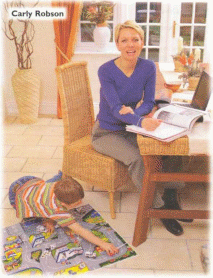
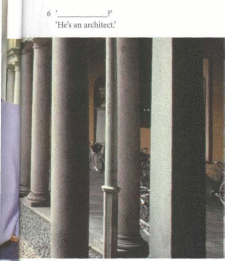

■
‘Dave.’
1
2
3
What... ?
Who... ? Where ... ? When ... ?
Why...?
How many... ? How much... ? How ... ? Whose... ? Which ... ?
►► Grammar Reference 1.1 and 1.2 p129
Complete the questions about Carly.
Where does she come from?
live?
live with?
What studying?
enjoying the course?
How many speak?
did her course start?
What after she graduates?
Listen to Carly, and write the answers to the questions.
Complete the questions to Carly.
‘Which university do you a о to?’
‘I don’t go to a university. I study at home.’
‘ a job?’
‘Yes, I do. A part-time job.’
‘What at the moment?’
‘I’m writing an essay.’
‘ to England?’
‘Fifteen years ago.’
‘ name?’
Find examples of present, past, and future tenses in the texts about Maurizio and Carly.
Which tenses are the two verb forms in these sentences? What is the difference between them?
He lives with his parents.
She’s living with an English family for a month.
Match the question words and answers.
Because I wanted to. Last night.
$5.
A sandwich.
By bus.
In New York, lack.
The black one.
It’s mine.
Four.
GRAMMAR SPOT
PRACTICE
T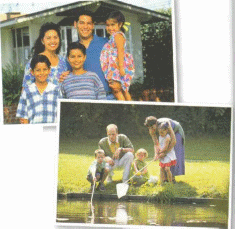 alking
about you
alking
about you
Ask and answer questions with a partner.
Where ... live?
... have any brothers or sisters?
What... like doing at the weekend?
Where ... go for your last holiday?
Make more questions. Use some of the question words in the Grammar Spot on p7.
Ask your teacher some of the questions.
In groups, ask and answer the questions.
Do you like listening to music?
What sort of music do you like?
What are you wearing?
What is your teacher wearing?
What did you do last night?
What are you doing tonight?
Write a paragraph about you. Use the text about Maurizio to help you.
G
Student В
Joy Darling started working as a postwoman thirty years ago, when she was 22. She drives a van because ... (Why?).
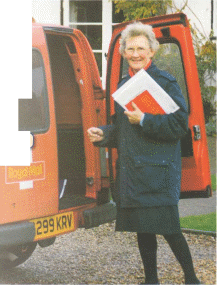 etting
information
etting
information
Your teacher will give you some information about Joy Darling, a postwoman. You don’t have the same information. Ask ап^Д
answer questions.
Student A
Joy Darling started working as a postwoman ... (When?). She drives a van because she delivers letters to a lot of small villages.
W
Thirty years

Why does she drive a van? —^
hen did she start working as a postwoman?Because she delivers letters to a lot of small villages.
—r~—
Check it
C
Maria comes / is coming from Chile.
She speaks / is speaking Spanish and English.
Today Tom wears / is wearing jeans and a T-shirt.
Are you liking / Do you like black coffee?
Last year she went / goes on holiday to Florida.
Next year she studies / is going to study at university.
Vocabulary
Using a bilingual dictionary
Look at this extract from the Oxford Portuguese Minidictionary.
Information in brackets (...) helps you to find the right translation.
The pronunciation in phonetic symbols
The translation
Other words made with book come at the end.

The part of speech (n. = noun, v. = verb)
~ means repeat the word, so this word is bookcase.
book [buk] n. livro; (notebook) caderno; // vTreservaFr^- case n. estante para livros; ~ mg offite-~M~lrail. theatTT^bilheteria;
~ seller n. livreiro;
W
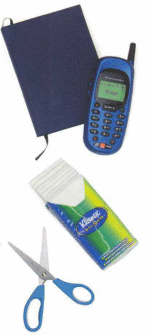 hat
are these words? Write noun,
verb, adjective, adverb, preposition, or
past
tense.
hat
are these words? Write noun,
verb, adjective, adverb, preposition, or
past
tense.
bread beautiful on
hot in came
write never eat
quickly went letter
These words have more than one meaning. Write two sentences that show different meanings. Use a dictionary.
Sentence
1
Sentence
2
book
I’m
reading a good book.
1
booked a room at a hotel.
kind
can
mean
flat
play
train
ring
Listen
to some sample answers.
4
What are the everyday objects in the pictures? Look around the room you are in. Find five things you don’t know the words for in English. Look them up in a dictionary.

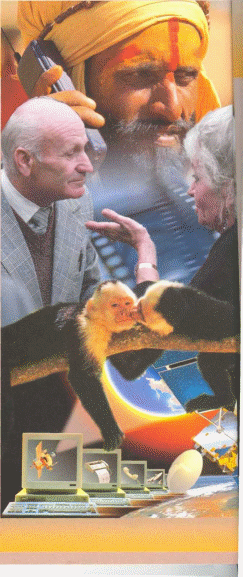

READING
Communication
1 How many different communicate?
ways can people
Match the pictures on pi 1 to each of the four ancient societies in paragraph three.
Read the text again and answer the questions.
Which animals are mentioned? What can they do?
What is special about human communication? What can we do?
Which four forms of media are mentioned in the last paragraph?
What is good and bad about information technology today?
What do you think?
What can animals do that people can’t?
How do you like to communicate?
What is happening in information technology now?
Your teacher will give you some ideas to communicate, but you can’t use words! Mime to your partner, and your partner has to guess what they are.
Read the text quickly and match the headings to the paragraphs.
A HISTORY OF COMMUNICATION
HOW WE COMMUNICATE COMMUNICATION TODAY
DIFFERENCES BETWEEN PEOPLE AND ANIMALS
f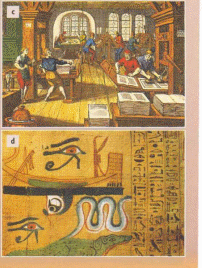
t
\
he great communicators
W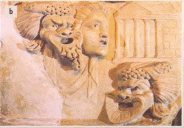 e
can communicate with other people in many different ways. We can
talk and write, and we can send messages with our hands and faces.
There is also the phone (including the mobile!), the fax, and
e-mail.Television, film, painting, and photography can also
communicate ideas.
e
can communicate with other people in many different ways. We can
talk and write, and we can send messages with our hands and faces.
There is also the phone (including the mobile!), the fax, and
e-mail.Television, film, painting, and photography can also
communicate ideas.
A
leira
nimals have ways of exchanging information, too. Bees dance and tell other bees where to find food. Elephants make sounds that humans can't hear. Whales sing songs. Monkeys use their faces to show anger and love. But this is nothing compared to what people can do. We have language - about 6000 languages, in fact. We can write poetry, tell jokes, make promises, explain, persuade, tell the truth, or tell lies. And we have a sense of past and future, not just present.Communication technologies were very important in the
development of all the great ancient societies:
Around 2900 BC, paper and hieroglyphics transformed Egyptian life.
The ancient Greeks loved the spoken word. They were very good at public speaking, drama, and philosophy.
The Romans developed a unique system of government that depended on the Roman alphabet.
In the 14th century, the printing press helped develop new ways of thinking across Europe.
Radio, film, and television have had a huge influence on society in the last hundred years. And now we have the Internet, which is infinite. But what is this doing to us?
We can give and get a lot of information very quickly. But there is so much information that it is difficult to know what is important and what isn't. Modern media is changing our world every minute of every day.
L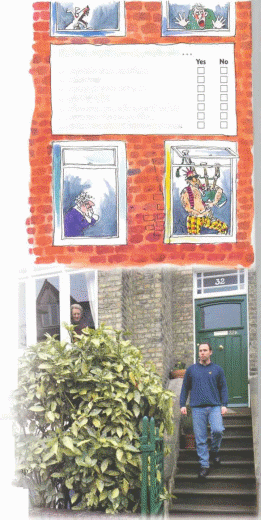 ISTENING
AND SPEAKING
ISTENING
AND SPEAKING
Neighbours
Who are your ideal neighbours? Complete the questionnaire on the right, then discuss your answers with a partner.
‘Good walls make good neighbours’.
What does this mean? Do you agree?
You will hear Mrs Snell and her new neighbour,
Steve, talking about each other.
Work in two groups.
Group A Listen to Mrs Snell.
Group В Listen to Steve.
Answer the questions.
When did Steve move into his new flat?
Is it a large flat?
What’s his job? Is it a good job?
Does he work long hours?
What does he wear for work?
Who is staying with Steve at the moment?
What time did Steve’s party end?
How many people came to the party?
What is Steve doing tonight?
10 Why doesn’t Mrs Snell want to speak to Steve?
Compare your answers with a partner from the other group. What are the differences?
Roleplay
Work in groups of three.
Student A You are Steve.
Student В You are Mrs Snell.
Student С You are another neighbour. You have invited them to your flat for coffee.
Continue the conversation below. Talk about these things.
Steve’s job • Steve’s sister • the party
Neighbour Do you two know each other?
Steve Well, we met a few days ago.
Mrs Snell But we didn’t introduce ourselves. I’m Mrs Snell. Steve Pleased to meet you.
Neighbour Steve works in advertising, you know ... ШШ(/ What do you think?
What do you understand by the words ‘generation g
Write down three things that young people think about older people and three things that older people think about young people. In groups, compare ideas.
My ideal neighbours are people who
... say hello when I see them.
... I never see.
... have parties and invite me.
... are very quiet.
... often come round for a cup of coffee.
... come round to borrow things.
... make themselves at home in my house

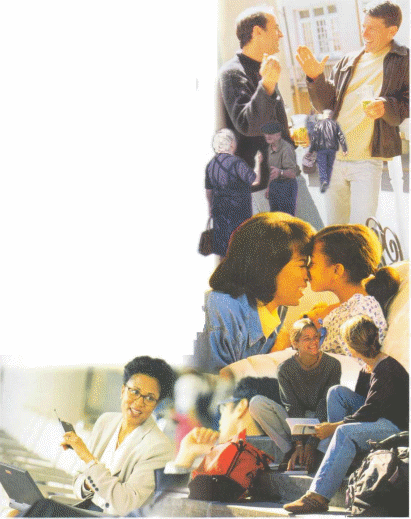

Listen and check. Practise saying them.
Test a partner. Say an expression. Can your partner give the correct response?
1 We use certain expressions in different social situations.
I’m
sorry I’m late!
I i
> ■ —■
( Don’t worry. Come and sit down.
Match the expressions and responses. When do we use these expressions?
Sleep well!
Yes. Can I help you?
Good morning!
Fine, thanks.
Pleased to meet you, Ela. Not at all. Don’t mention it. Thanks.
Same to you!
That’s very kind. Thank you. Bye!
How do you do?
Hi, Peter!
Cheers!
How are you?
Hello, Jane!
How do you do?
See you tomorrow!
Good night!
Good morning!
Hello. I’m Ela Paul.
Cheers!
Excuse me!
Bless you!
Have a good weekend!
Thank you very much indeed. Make yourself at home.
With your partner, write two short conversations that include some of the social expressions.
Read your conversations to the class.
EVERYDAY ENGLISH
Social expressions 1
Unit 1 • Getting to know you 13

The way we live
P resent
tenses * have/have
got
♦ Collocation - daily life • Making conversation
resent
tenses * have/have
got
♦ Collocation - daily life • Making conversation




STARTER
The United States Canada Australia New Zealand South Africa Scotland
These flags all belong to English-speaking countries. Write the name of the country,
«яки!
1M

PEOPLE AND PLACES
Present tenses and have/have got
1 Read the texts. Match a country from the Starter with a text and a photograph. Complete the texts with the words from the boxes.
ICE exports enjoy immigrants huge
This country has quite a small population, just 16 million, but the
country is . The people are
mainly of European descent, but there are also aborigines and a lot of
south-east Asian . People live
in towns on the coast, not so much inland, because it is so hot. They live a lot of their lives outdoors,
and sports, swimming, and
having barbecues. This country
wine and wool - it has more
than 60 million sheep!
DUE favourite variety has only
This is the second biggest country in the world, but it has a population of
30 million. It is so big that there is
a of climates. Most people live in
the south because the north is too cold. It is famous for its beautiful
mountains and lakes - it more
lakes than any other country. Their sports are baseball and ice hockey.
HUE elephants grows black climate
This country has a population of about 45 million. Of these, 76 per cent are
and 12 per cent white. It has a
warm . Either it never rains, or it
rains a lot! It is the world's biggest producer of gold, and it exports
diamonds, too. It a lot of fruit,
including oranges, pears, and grapes, and it makes wine. In the game reserves you can see a lot of wildlife,
including lions, , zebras, and
giraffes.
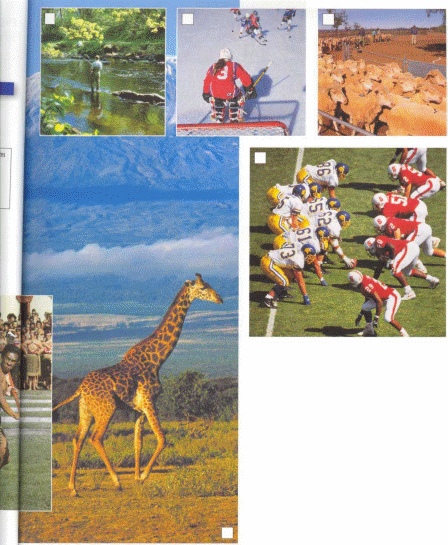
Close your books. Remember three facts about each country.
GRAMMAR SPOT
►► Grammar Reference 2.1-2.4 pl30
4 Give some similar facts about your country.
4>W Listen to three people describing the other countries. Match a country from the Starter with a description and a photograph.
d □ e □ f □
What tense are all the verb forms in texts a-с? Why?
Look at the sentences. Which refers to all timel Which refers to now?
She has three children.
She’s having a shower.
Is have or have got used in texts a-с? And in d and e?
Is have got more formal or informal?

PRACTICE
Talking about you
1 Practise the forms of have and have got in the question, negative, and short answer.
D
No, I don’t.
o you have a car?H
Yes, I have.
ave you got a car?
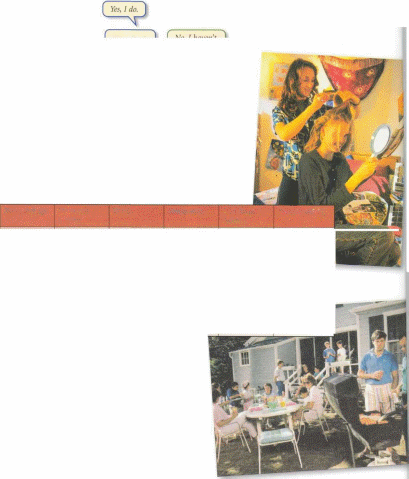
I
I don’t have a computer.
haven’t got a computer.Г”
Listen and repeat.
A
a credit card
a Walkman
a mobile phone
a pet
a computer
brothers and sisters
y
a stereo
a camera
a bicycle
your sister/a car
your brother/a motorbike
Getting information
Work with a partner.
Student A Look at this chart.
Student В Look at the chart from your teacher.
Name and age
Town and country
Family
Occupation Free time/ holiday
Present activity
Mike. 26
Lucy, 38
Nicole, 15
Texas, the United States
two brothers and a dog!
student at high school
listens to music
Florida or Mexico
getting ready to go out
Jeff, 54, and Wendy. 53
Melbourne,
Australia
one daughter and three grandchildren
He ... office. She... hairdresser.
having a barbecue in the back yard
tennis, swimming
Bali
every summer
W
in
rite questions to find the information about the people your chart.W
Town/country
Family
Occupation Free time/holiday
here does he ... from?
«... married? • Has he got... ?
Does she have... ? • How many ... ?
What... do?
What does she... in her free time?
Where... go on holiday?
What... doing at the moment?
Present activity
Listen and compare.
Ask and answer questions with your partner to complete your chart.
Think of questions to ask about free time and holiday activities.
What do you do in your free time?
